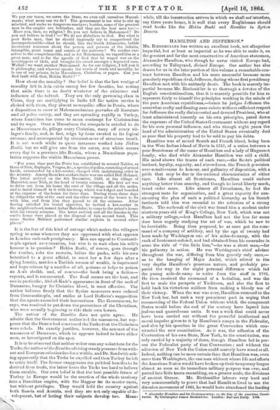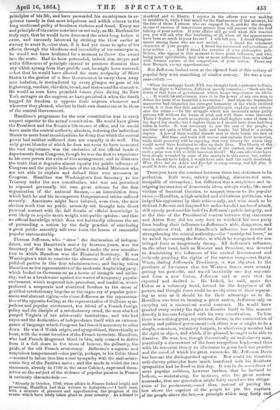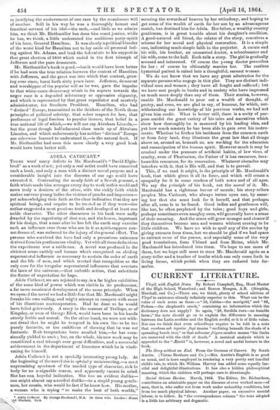HAMILTON AND JEFFERSON.*
MB. RIETHMULLB11 has written an excellent book, not altogether impartial, but at least as impartial as he was able to make it, on the greatest and far the most constructive of American statesmen, Alexander Hamilton, who though he never visited Europe had, according to Talleyrand, divined Europe. Our author has also drawn for us in the later portion of this volume a remarkable con- trast between Hamilton and his more successful because more genuinely republican rival, Jefferson, during whose first presidency Hamilton met with his untimely death. The book is scarcely im- partial because Mr. Riethmiiller is so thorough a devotee of the English constitutionalism, that it is scarcely possible for him to represent fairly to himself the principles working in the minds of the pure American republicans,—hence he judges Jefferson the somewhat crafty and flaming sans-culotte without sufficient respect for Jefferson the really disinterested and devoted President, who at least administered honestly on his own principles, pared down the expenses of the United States Government without any regard for his own personal influence, and who though eight years the head of the administration of the United States eventually died so poor that his property had to be sold to pay his debts.
Hamilton was of mixed Scotch and French blood, being born in the West Indian island of Nevis in 1757, of a union between a poor Scotchman of the name of Hamilton and a lady of Huguenot family, who died while Alexander Hamilton was still a child. His mind shows the traces of each race,—the Scotch political instinct, loyalty, sagacity, and shrewdness, the French precision over-sensitiveness to honour, and gallantry of disposition, with a pride that may be due to the national characteristics of either race. Like almost all Scotchmen, Hamilton could endure anything better than anarchy, and though he loved liberty much, loved order more. Like almost all Frenchmen, he had the strongest taste for organization, and a great capacity for con- structing the plan of such a political hierarchy as his Scotch instincts told him was essential to the cohesion of a strong State. The outbreak of the civil war found him a student under nineteen years old of King's College, New York, which was not a military college,—but Hamilton had not the less for some time been eagerly studying the art of war, which he saw to be inevitable. Being thus prepared, he at once got the com- mand of a company of artillery, and by the age of twenty had been made by Washington one of his aides-de-camp, with the rank of lieutenant-colonel, and had obtained from his comrades in arms the title of " the little lion,"—he was a short man,—for his gallantry in action. He was Washington's chief adviser throughout the war, differing from him gravely only once,— as to the hanging of Major Andre, which stirred to the very depths Hamilton's generous nature, and probably pre- pared the way to the slight personal difference which led the young aide-de-camp to retire from the staff in 1781. He than received the command of a battalion, and was the
first to scale the parapets of Yorktown, and also the first to hold back his victorious soldiers from making a bloody use of their victory. When the war was over, Hamilton returned to the New York bar, but took a very prominent part in urging that recementing of the Federal Union without which the component States would before the end of the century have lapsed into jealous and quarrelsome units. It was a work that could never have been carried out without the powerful intellectual and moral impulse given to it by Hamilton's essays in the Federalist, and also by his speeches in the great Convention which con- structed the new constitution. As it was, the adhesion of the Convention of his own State, New York, to the constitution, was only carried by a majority of three, though Hamilton led in per- son the Federalist party of that Convention ; and without the adhesion of New York the Union could scarcely have stood at all. Indeed, nothing can be more certain than that Hamilton was, even more than Washington, the one man without whose life and efforts
the American States would have broken up their temporary league almost as soon as its immediate military purpose was over, and parted into little knots resembling, on a greater scale, the divisions of ancient Greece. Mr. Riethmiiller labours very hard and very unsuccessfully to prove that had Hamilton lived to see the disunion movement of 1861, he would have abandoned the leading • Alexander Hamilton and his Contemporaries; or, the Rue of the American Conga. ratios. B1 Christopher James Biethminler. London: Bell and Daldy. 1804.
principles of his life, and have persuaded his countrymen to ac- quiesce tamely in that most iniquitous and 'selfish climax to the long continued policy of Southern violence and fraud. Every act and principle of his career convince us not only, as Mr. Riethmiiller truly says, that he would have discerned the crisis long before it came, and earnestly laboured by strikiug the blow earlier at slavery to avert it,—but that, if it had yet come in spite of his efforts, through the blindness and incredulity of his countrymen, he would not have hesitated for a moment to throw the sword into the scale. Had he been persuaded, indeed, that deeper and wider differences of principle existed to promote disunion than any which sprang from that prolific root, he might have wavered, —but that be would have allowed the mere antipathy of Slave
States to the genius of a free Government to carry them away into isolation, is contradicted by every glimpse we gain of his highstrung, resolute, chivalric, broad, and statesmanlike character.
He would as soon have preached laissez faire during the New York outrages on the negroes, as have preached it when the South
begged for freedom to oppress their negroes whenever and wherever they pleased, whether in their own dominions or in those of the central Government.
Hamilton's programme for the new constitution was in every respect superior to the actual constitution. He would have given the President and the Senate a life-tenure of office, and he would
have made the central authority absolute, reducing the individual States to mere local municipalities for doing that which the central power had neither sufficient time nor capacity to do well. The only great blunder of which he does not seem to have measured the vast importance was the exclusion of the official heads of departments from Congress, though he was the first to experience in his own person the evils of this arrangement, and to illustrate the truth that it degrades almost equally the public influence of Congress and the public influence of the excluded Ministers who are not able to explain and defend their own measures in Congress. Hamilton was Washington's first Secretary to the Treasury under the new constitution, and was not permitted to expound personally his own great scheme for the first organization of the national finance, — an interdiction from which both he and his incompetent Congressional critics suffered severely. Americans might have inferred, even then, the now obvious truth that no public assembly not brought into direct personal contact with the full details of official knowledge is ever likely to acquire much weight with public opinion ; and that no official knowledge which does not habitually rehearse the art of persuading a nation by the daily practice of convincing a great public assembly will ever learn the lesson of successful popular statesmanship.
Thomas Jefferson, who " drew " the declaration of indepen- dence, and was Hamilton's senior by fourteen years, was the Secretary of State in that first Cabinet under the new constitu- tion in which Hamilton was the Financial Secretary. It was .Washington's wish to combine the elements of all the different political parties in this first administration ; and having taken Hamilton as the representative of the moderate Anglicizing party, which looked to Government as a tower of strength and autho- rity, and as a breakwater against the waves of temporary popular .excitement, which respected law, precedent, and tradition, which preferred a temperate and chartered freedom to the sense of gratified revolutionary impulse or the vague cry of popular griev- ances and abstract rights,—he chose Jefferson as the representa- tive of the opposite feeling, as the representative of Galilean sym-
-pathies and popular excitement, the friend of a French foreign
policy and the disciple of a revolutionary creed, the man who had purged Virginia of her aristocratic institutions, and who had expressed the declaration of independence itself with an extrava- gance of language which Congress had found it necessary to sober down. He was of Welsh origin, and sympathized, theoretically at least, with the worst ferocities of the French terrorists. Hamilton, who had French Huguenot blood in him, only seemed to derive from it a full share in the sense of honour, the gallantry, the pride, of the old French aristocracy. Jefferson's sanguine and auspicious temperament—due partly, perhaps, to his Celtic blood —seemed to infuse into him a real sympathy with the anti-aristo- cratic fury of the Parisian mobs ; and the mode in which the two statesmen, already in 1790 in the same Cabinet, expressed them- selves on the subject of the violence of popular passion in France is curiously characteristic :-
"Already in October, 1789, when affairs in France looked bright and promising, Hamilton had thus written to Lafayette :--` I have seen, with a mixture of pleasure and apprehension, the progress of the events which have lately taken place in your country. As a friend to
mankind and to liberty, I rejoice in the efforts you are making to establish it, while I fear much for the final success of the attempt, for the fate of those I esteem who are engaged in it, and for the danger, in case of success, of innovations greater than will consist with the real felicity of your nation. If your affairs still go well when this reaches you, you will ask why this foreboding of ill, when all the appearances have been so much in your favour? I will tell you. I dread disagree- ments among those who are now united. . . . I dread the vehement character of your people.. . I dread the interested refractoriness of your nobles. . . . And I dread the reveries of your philosophic poli- ticians, who appear in this moment to have great influence, and who being mere speculatists, may aim at more refinement than suits either with human nature or the composition of your nation. These, my dear Marquis, are my apprehenaions."
But Jefferson looked even at the ripened fruit of this ecstasy of popular fury with something of similar ecstasy. He was a true sans-culotte :—
" When the unhappy Louis XVI. was brought back a prisoner to Paris, after the flight to Varennes, Jefferson merely remarks Such are the fruits of that form of government which heaps importance on idiots. . . . It would be unfortunate were it in the power of any one man to defeat the issue of so beautiful a revolution !' And when the September massacres had disgusted the outraged humanity of the whole civilized world, it is thus that this amiable philanthropist explains and extenu- ates the crime :—‘ In the struggle which was necessary many guilty persons fell without the forms of trial, and with them some innocent. These I deplore as much as anybody, and shall deplore some of them to the day of my death ; but I deplore them as I should have done had they fallen in battle. It was necessary to use the arm of the people, a machine not quite so blind as balls and bombs, but blind to a certain degree. A few of their cordial friends met at their hands the fate of enemies. But time and truth will rescue and embalm their memories, while their posterity will be enjoying that very liberty for which they would never have hesitated to offer up their lives. The liberty of th‘_, whole earth was depending on the issue of the contest, and was ever' such a prize won with so little innocent blood? My own affections have been deeply wounded by some of the martyrs to this cause, but, rather than it should have failed, I would have seen half the earth desolated. Were there but an Adam and Eve left in every country, and left free, it would be better than as it now is.' " There you have the contrast between these two statesmen in its perfection. Both were, strictly speaking, disinterested men, incapable of corruption ; but Jefferson was a suspicious and in- triguing incarnation of democratic ideas, always ready, like most victims of fanatical theories, to suspect treason to the popular cause ;—Hamilton, a high-minded and chivalrous politician, who judged his opponents by their actions only, and who, much as he disliked Jefferson and despised his under-handed modes of attack, still openly professed his belief in Jefferson's public integrity, and at the time of the Presidential contest between that statesman and Aaron Burr did his very best to withhold his' own party from lending their influence to Jefferson's able, dangerous, and unscrupulous rival. All Hamilton's influence was devoted to strengthening the central authority,—the " centripetal force," as he called it,—among the States, in which he recognized the cen- trifugal force as dangerously strong. All Jefferson's influence, on the other hand, both as Minister and President, was devoted to diminishing the influence of the central Government and jealously guarding the rights of the various component States. When, during Jefferson's Presidency, it was objected to the purchase of Louisiana that the Western States were already getting too powerful, and would inevitably one day separate and form a new Union, Jefferson said at once that he expected and desired it. He looked, he said, upon the Union as a voluntary bond, formed for the happiness of all parties, and thought there could be no objection to their separat- ing as soon as it should be for their advantage so to do. Hamilton was bent on forming a great nation, Jefferson only on carrying out a convenient social contract. He would have granted every society the right to dissolve itself in like manner directly it became fatigued with its own constitution. To him there was nothing great, mysterious, divine, in the constitution of society and political government:—it either was or ought to be a simple, conscious, voluntary bargain, to which every member had the right to object, and which, if he pleased, he ought to be able to dissolve. He was, too, though theoretically an anti-slavery man, practically a slaveowner of the least scrupulous kind,—and thus with his secession theory lie illustrates in germ both the practice and the creed of which his great namesake Mr. Jefferson Davis has become the distinguished apostle. Nor would his theoretic anti-slavery principles have 'much interfered with his Southern sympathies had he lived to this day. It was in the sacredness of mere popular volitions, however lawless, that he inclined to believe, — maintaining, for instance, with his great modern namesake, that one generation might fairly repudiate the obliga- tions of its predecessor,—and thus, instead of putting the law above the caprices of the people he put the caprices of the people above the law,—a principle which may fairly end
in justifying the enslavement of one race by the unanimous will of another. Still in his way he was a thoroughly honest and fanatical servant of his idol—the mob,—and little as we admire him, we think Mr. Riethmiiller has done him scant justice, while he has, we think, a little underrated the ambitious party-spirit of his hero, General Hamilton. It was clearly a political blunder of the worst kind for Hamilton not to lay aside all personal feel- ing against Mr. Adams, and lead the federalists to his support in that great election of 1800 which ended in the first triumph of Jefferson and the pure democrats.
Mr. Riethmiiller's book is good,—but it would have been better if he had seen the true relation between the contest of Hamilton with Jefferson, and the great war into which that contest, grow- ing ever since, burst forth sixty years later•. Jefferson, democrat and worshipper• of the popular will as he was, gave the impulse to that white-caste-democracy which in its aspects towards the negro race is a degraded aristocracy or oppressive oligarchy, and which is represented by that great repudiator and masterly administrator, the Southern President. Hamilton, who had " divined" Europe, transmitted to the thinkers of the North those principles of political sobriety, that sober respect for law, that preference of legal freedom to popular licence, that belief in a true national life of which,—we will not say Abraham Lincoln,— but the great though half-educated class made up of Abraham Lincolns, and which unfortunately has neither " divined" Europe nor otherwise learned to understand it,—is the natural fruit. If Mr. Riethmiiller bad seen this more clearly a very good book would have been better still.
































 Previous page
Previous page